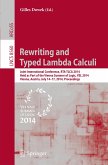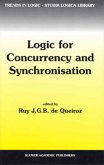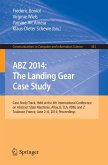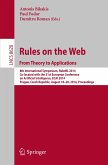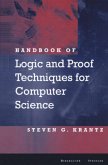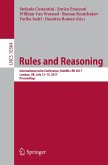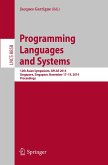Gerhard Gentzen has been described as logic's lost genius, whom Gödel called a better logician than himself. This work comprises articles by leading proof theorists, attesting to Gentzen's enduring legacy to mathematical logic and beyond. The contributions range from philosophical reflections and re-evaluations of Gentzen's original consistency proofs to the most recent developments in proof theory. Gentzen founded modern proof theory. His sequent calculus and natural deduction system beautifully explain the deep symmetries of logic. They underlie modern developments in computer science such as automated theorem proving and type theory.
"The book collects for the first time individual studies which focus solely on this aspect of Gentzen's work. Because they admirably elucidate the historical, philosophical, and technical facets of his foundational papers in ordinal proof theory, the book can be recommended to everyone interested in these topics." (David Binder, Journal for General Philosophy of Science, Vol. 49, 2018)
"The volume is undoubtedly of a high-level technical content and thus of great interest for computer scientists and mathematical logicians. However, thanks to the numerous chapters containing philosophical reflections and historical information, the volume is also appealing for philosophers of logic." (Francesca Poggiolesi, History and Philosophy of Logic, Vol. 38 (3), March, 2017)
"The articles in this collection clearly offer a wide and lively description of Gentzen's work and of Gentzen's legacy. ... This volume will be for years to come an important key tool not only for people working in reductive and ordinal proof theory, but also for anyone more in general interested in the field of proof theory." (Enrico Moriconi, History and Philosophy of Logic, Vol. 38 (2), January, 2017)
"Gentzen's work has provided the blueprint, in many ways, for work in proof theory that has been extending its reach beyond arithmetic to subsystems of analysis and also to parts of set theory. ... This is an exciting volume: informative in many different ways about the background and current state of proof theory, in particular of those parts that have been shaped by Gentzen's work." (Wilfried Sieg, Jahresbericht der Deutschen Mathematiker-Vereinigung, Vol. 119, 2017)
"This book is thefollow-on to the 2009 symposium in Leeds celebrating the centenary of the great German logician Gerhard Gentzen. It contains survey as well as technical chapters by highly respected proof theorists. It is of interest to logicians and computer scientists working in theorem proving, type theory, and proof complexity." (K. Lodaya, Computing Reviews, April, 2016)
"The volume is undoubtedly of a high-level technical content and thus of great interest for computer scientists and mathematical logicians. However, thanks to the numerous chapters containing philosophical reflections and historical information, the volume is also appealing for philosophers of logic." (Francesca Poggiolesi, History and Philosophy of Logic, Vol. 38 (3), March, 2017)
"The articles in this collection clearly offer a wide and lively description of Gentzen's work and of Gentzen's legacy. ... This volume will be for years to come an important key tool not only for people working in reductive and ordinal proof theory, but also for anyone more in general interested in the field of proof theory." (Enrico Moriconi, History and Philosophy of Logic, Vol. 38 (2), January, 2017)
"Gentzen's work has provided the blueprint, in many ways, for work in proof theory that has been extending its reach beyond arithmetic to subsystems of analysis and also to parts of set theory. ... This is an exciting volume: informative in many different ways about the background and current state of proof theory, in particular of those parts that have been shaped by Gentzen's work." (Wilfried Sieg, Jahresbericht der Deutschen Mathematiker-Vereinigung, Vol. 119, 2017)
"This book is thefollow-on to the 2009 symposium in Leeds celebrating the centenary of the great German logician Gerhard Gentzen. It contains survey as well as technical chapters by highly respected proof theorists. It is of interest to logicians and computer scientists working in theorem proving, type theory, and proof complexity." (K. Lodaya, Computing Reviews, April, 2016)

